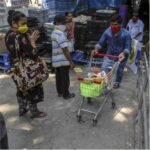A Global Lockdown and Panic Buying
 The onset of lockdowns across the globe in early 2020 brought an unprecedented wave of fear and uncertainty. People rushed to stockpile essentials like rice, pulses, and vegetables, preparing for potential disruptions in production and supply chains.
The onset of lockdowns across the globe in early 2020 brought an unprecedented wave of fear and uncertainty. People rushed to stockpile essentials like rice, pulses, and vegetables, preparing for potential disruptions in production and supply chains.
For some, “essentials” also included a generous stash of alcohol, ensuring their spirits stayed high during the long, uncertain days of isolation. Grocery stores saw long queues, and shelves emptied as panic buying became the new normal.
The Great Toilet Paper Shortage
 While the Eastern world focused on food essentials, news from the Western world revealed an unexpected crisis: a shortage of toilet paper. Images of empty supermarket shelves, frantic shoppers, and even riots over toilet paper rolls flooded global media. Governments in Western countries reassured their citizens that stockpiles of toilet paper were sufficient to last for years.
While the Eastern world focused on food essentials, news from the Western world revealed an unexpected crisis: a shortage of toilet paper. Images of empty supermarket shelves, frantic shoppers, and even riots over toilet paper rolls flooded global media. Governments in Western countries reassured their citizens that stockpiles of toilet paper were sufficient to last for years.
For those of us in the East, the idea of a “toilet paper crisis” was puzzling. While we scrambled to secure enough staples to feed our families, the thought of queueing up for toilet paper felt like a luxury we couldn’t afford to prioritize.
Two Worlds, Two Necessities
Sitting at home and reading these stories, I realized that the global pandemic had exposed a stark contrast between two worlds:
 The Developed World, where basic needs like food are taken for granted, and hygiene products like toilet paper are considered indispensable.
The Developed World, where basic needs like food are taken for granted, and hygiene products like toilet paper are considered indispensable.- The Developing World, where the priority remains securing enough food to survive, with hygiene concerns taking a backseat to hunger.
 While the world has become more interconnected than ever, this crisis highlighted the deep socio-economic divide. For one part of the world, hunger is the primary concern. For the other, hygiene represents an essential part of maintaining a high standard of living.
While the world has become more interconnected than ever, this crisis highlighted the deep socio-economic divide. For one part of the world, hunger is the primary concern. For the other, hygiene represents an essential part of maintaining a high standard of living.
Lessons from the Crisis
The “toilet paper crisis” might seem trivial to some, but it underscores the diversity of human needs and priorities. It reminds us that what’s essential in one part of the world might be secondary—or even incomprehensible—in another.
In times of crisis, these differences become stark, but they also present an opportunity for empathy, understanding, and a broader perspective on what truly matters.



